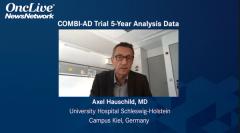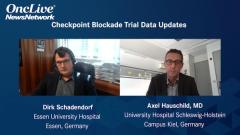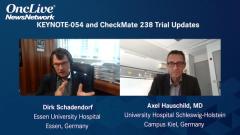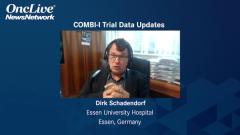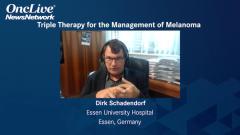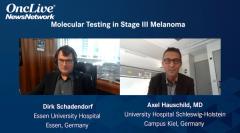
KEYNOTE-054 and CheckMate 238 Trial Updates
Episodes in this series

Transcript:
Axel Hauschild, MD:This is very good bridge to the question I wanted to address to you to discuss CheckMate 238 on nivolumab vs high-dose ipilimumab, because you are mentioning it already. There is 1 caveat we didn’t discuss, and we can mention it only briefly. In CheckMate 054, in contrast to COMBI-AD, there is in the clinical trial protocol the option for the crossover. This allows for patients who were progressive on placebo and those who had at least 6 months of a stabilization without progressive disease on pembrolizumab when they stopped to cross over to pembrolizumab. This is certainly also diluting the interpretation of the data in the long run, particularly on overall survival.
Dirk Schadendorf, MD: That’s a very important point because if we see that at 2 years later also there is no overall survival benefit because of the crossover, would that mean that we would not need adjuvant treatment in stage III at all? We just wait? Because we know that roughly one-third of the patients will never relapse if they got surgery done properly. Would we just wait, and those patients who get new treatment get treatment? Would that be the consequence for you?
Axel Hauschild, MD:That’s a very good question. I was hoping that you wouldn’t address the question to me because it’s pure speculation. It’s a secondary end point, more or less, to ask this question, and it’s very fair. I would say no. I have my doubts that we would see overlapping survival curves 1 day. I’m pretty sure that they would still stay separated because there is a very good relapse-free survival in all these clinical trials in our days on the active drugs. This was also going along with overall survival improvement. I personally have no doubt, but this is gut feeling at the moment, and it’s not the data. I want to address the same question for you, because ipilimumab and nivolumab—we’ll say it in advance—showed more or less the same overall survival at the last data cut. How do you interpret this in the context of your question?
Dirk Schadendorf, MD: That’s what has stimulated our discussion in the last minute, because we have seen at ESMO [European Society for Medical Oncology Congress] as presented by Jeff Weber very nicely the update on the CheckMate 238 data. We see also in that cohort the relapse-free survival difference, the distant metastases-free survival difference, and surprisingly, at the 4-year landmark, the overall survival curves are completely overlapping. No difference at all. This caught everyone by surprise, and obviously it’s a little early to speculate on the exact reasons. If you look for subsequent therapies, one sees that in both groups roughly 70% of the patients are receiving systemic treatment, and in the group of ipilimumab-treated patients in the adjuvant setting, they are getting predominantly treated with PD-1–based regimens. Obviously, if you have been treated in the adjuvant setting with high-dose ipilimumab, there is a certain rescue potential for nivolumab subsequently in the metastatic setting. And the other way around, that in patients who have failed nivolumab, there is a small percentage who are benefiting from subsequent ipilimumab treatment. It is sort of surprising for me to see these survival curves, because in the metastatic setting we have had a similar clinical trial. This trial, CheckMate 064, which was presented by Stephen Hodi a couple of years ago, was testing a run-in phase of 2 or 3 months of nivolumab and then switching to ipilimumab, and the second arm was doing the opposite, started with the 4 doses of ipilimumab and then switching to nivolumab. The overall survival results for that were clearly different in favor of the group that started with nivolumab and then tried to continue with ipilimumab in contrast with the other group, so I was surprised to see that overall survival was overlapping so much. I don’t have any good explanation for that.
Transcript Edited for Clarity


